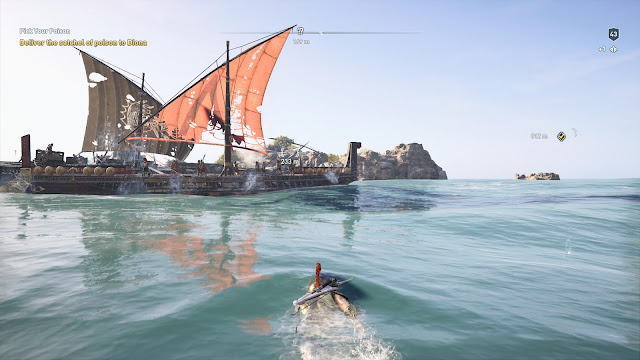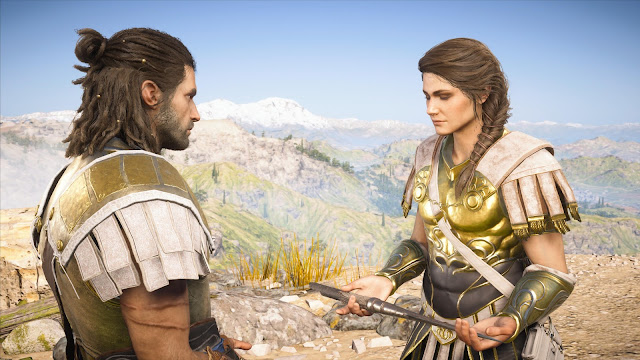HOMER WOULD BE DISGUSTED
Following the chronology of the Assassin’s Creed series has become a depressing exercise. Assassin’s Creed: Odyssey is the eleventh entry in this long-running saga—and quite possibly my last. I can no longer tolerate this design bloat, implemented for one reason only: to stretch playtime and increase the odds that I’ll buy something from the Ubisoft store. Watching creativity slowly suffocate in the chokehold of corporate greed feels genuinely tragic. The next entry, Assassin’s Creed: Valhalla, is allegedly even more bloated. I already know I’ll hate it, should I ever play it.
It’s gross. Not leveling fast enough? Buy a permanent XP booster. Don’t like the money rewards? Buy a permanent drachma booster. Can’t upgrade your favorite bow? Buy a resource pack. And on it goes. Of course, you don’t have to buy them—but the game becomes unbearably dull if you don’t. Here’s another unpleasant truth: the story is only loosely tied to the overarching Assassin’s Creed mythology. It feels like an afterthought, as if this game was stapled onto a popular brand purely to inflate sales.
And that’s a damn shame, because on a technical level the series has never looked better. Set in ancient Greece and steeped in classical mythology, Odyssey bombards you with eye candy. Waves crash against golden shores. Spartan ships clash with Athenian fleets in the distance. Sunlight glints off metal armor. Verdant islands glow blue at night, lanterns painting the Mediterranean in warm hues. Character animation is excellent, with a staggering number of combat moves and acrobatics giving the protagonist an expressive physicality.
But after enough hours, the illusion cracks. Everything starts to look the same. Cities are built from identical components. Natural environments lack meaningful variation. Caves recycle the same few layouts over and over. The beauty is skin-deep—perfect for screenshots, but incapable of creating a place that feels shaped by war or history.
Wait—there’s a war? Supposedly. Odyssey opens with a cinematic depicting the legendary stand of the 300, with King Leonidas leading Spartan forces against overwhelming odds. It’s an effective hook, showcasing the game’s core strengths: fast, flashy combat with charged abilities, parries, dodges, and heavy blows. We already know how it ends—history books see to that—but it’s a strong start, even if it’s a tutorial structure we’ve seen countless times before.
This prologue ripples into the main narrative, though you’ll need to play for a long time before that connection becomes clear. You follow a sprawling Greek family tragedy, playing as either Alexios or Kassandra—siblings separated by fate—trying to reunite or destroy their family based on your choices. Along the way you rub shoulders with historical figures like Socrates and Pericles. Some moments land, buoyed by solid voice acting and occasional dramatic weight, but they’re scattered across far too many hours to sustain momentum.
You’re free to roam the entirety of Greece, with each region supposedly caught in a quiet struggle between Spartan and Athenian forces. You can weaken the ruling faction by sabotaging supply lines, eventually triggering a large-scale battle where you choose sides. Mechanically, it works well enough—but narratively, it’s meaningless. The outcome has no real impact.
Somewhere along the way, you also stumble into the Assassin Brotherhood. I almost forgot about it myself, which says a lot. It feels optional, raising the question of why the modern-day storyline exists at all. It intermittently interrupts the historical drama with Layla Hassan diving into the Animus in search of the Staff of Hermes. It’s so dull I had to look up a plot summary just to remember what was supposed to matter.
Back in ancient Greece, the main antagonists emerge as the Cult of Kosmos, shadowy figures pulling strings across the land. In theory, uncovering and assassinating them one by one sounds compelling. In practice, most of them die incidentally while you’re busy clearing unrelated questlines.
The assassinations themselves are disappointingly rote. With nearly every surface climbable, gaining the high ground is trivial. Once above your target, killing them is rarely a challenge. This is compounded by overpowered RPG abilities. Whether you invest in assassination, ranged combat, or melee, you can deal absurd damage. A single high-level explosive arrow can wipe out entire groups and heavily injure bosses—almost a necessity, since standard melee combat is a tedious slog of parries and counterattacks.
Melee combat quickly devolves into repetition. Enemy variety is limited, and many foes are damage sponges with narrow vulnerability windows. Min-maxing your build becomes less an option than a requirement. That means endless menu management, constant upgrading, and juggling gear just to make fights tolerable. Legendary animals—advertised as major challenges—can take ages to kill.
Gear is the heart of the problem. Every weapon and armor piece is constantly outleveled. Upgrading them is prohibitively expensive, forcing you to swap equipment constantly. This prevents any sense of attachment and makes looting—and by extension exploration—feel pointless.
Combat happens far too often, despite never being truly exciting. Add the bounty system on top of that, with mercenaries relentlessly hunting you for minor crimes, frequently barging into ongoing fights. It’s intrusive and exhausting.
Eventually you gain a ship, introducing mandatory naval gameplay. Sailing among famous islands like Mykonos and Lesbos provides a brief change of pace and some visual freshness. But naval combat feels almost unchanged from Assassin’s Creed IV: Black Flag, and by this point the repetition has already set in.
The game wears its Witcher 3 influence on its sleeve. Some moral choices carry consequences, and a rudimentary dialogue system allows for light role-playing. When the narrative failed to engage me, I leaned into playing Alexios as an aggressive, reckless brute—often to unintentionally hilarious effect. In one case, I slaughtered a group of innocent people hiding in a cave because my Alexios failed to grasp their obvious innocence.
But as an odyssey, this game utterly fails. Once a franchise defined by excitement and imagination, Assassin’s Creed has been reduced to yet another bland open world. I felt less like an adventurer and more like a wage laborer—running errands for scraps and disposable loot. After a 76-hour playthrough, very few memories remain, and most of them come from the final stretch simply because they’re the most recent.
Narratively, the experience is scattershot. You’re herded across Greece, region by region, juggling too many questlines at once. Each area is gated by level requirements, forcing you to grind side quests just to keep up. These side quests are poorly designed and exist primarily to generate experience points.
Then there’s the resource grind. Weapons, armor, bows—everything needs constant upgrading. This demands absurd quantities of gold, leather, iron, cloth, and wood. Looting alone won’t cut it. Hunting animals is slow. Naval raiding helps, but even that grows tiresome. You might spend half an hour just to upgrade a single weapon tier. And as a final insult, the same resources are required to upgrade your ship—mandatory, since enemy ships scale with you.
If the mechanics evolved meaningfully, this might have been tolerable. They don’t. This is an unforgivable disrespect for the player’s time. As real-world weeks pass, progression slows to a crawl. Rewards diminish. And subtly—yet unmistakably—you’re nudged toward the Ubisoft store, where you can buy “Time Savers.” That name alone confirms the intent. Ubisoft is holding its own game hostage, charging extra to relieve the boredom it deliberately engineered.
Imagine reading Homer’s The Odyssey, but padded with endless filler—tedious travel logs, pointless conversations, Odysseus constantly visiting blacksmiths to upgrade his gear. Then imagine being told you can pay extra to have Homer appear in your room and tear out the boring pages. That’s Assassin’s Creed: Odyssey.
Ubisoft must be delusional. This game has no business being this long. Why stretch 10 hours of decent mechanics into 80? Why build such a massive world from recycled assets? Why tie it to the Assassin mythos while randomly sprinkling in Greek monsters? Why not make it its own franchise? As I write this, Ubisoft’s decline feels self-inflicted. They’ve mistaken endurance for engagement.
I enjoyed the game briefly, but spent roughly 60 hours indifferent or outright bored. The final missions—featuring mythological creatures like Medusa and the Minotaur—offered some novelty, but nowhere near enough to justify the time investment. I finished the game solely to write an honest review.
I once called Assassin’s Creed: Odyssey the worst open-world game I’ve played, alongside Biomutant. That was imprecise. It’s not the worst—it’s the most boring. Technically, it’s highly competent. I genuinely feel for the talented artists and engineers involved. But I cannot recommend it. My two-star rating reflects its technical polish and serviceable mechanics—nothing more. As a holistic experience—story, world, quests, characters, RPG systems, exploration, and combat—this game is a deliberately engineered snoozefest.





















Comments
Post a Comment